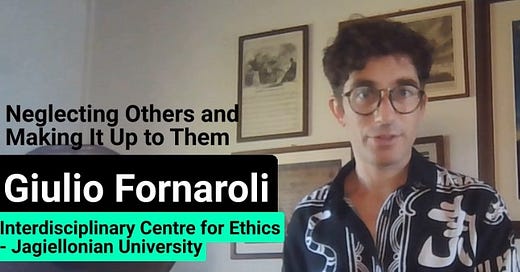Corrective practices are everywhere. Consider the importance of apologies in ordinary interactions or all the legal requirements that deal with reparations of individual wrongs. But, as moral agents, when exactly are we required to correct? And what does it mean to correct?
Some theorists (mostly Kantian) believe that we need to correct whenever we interfere with others' freedom, at least when their exercise of freedom is compatible with the freedom of others. But I show that these ideas are too abstract to explain what it means to correct. Other theorists advance the elegant thesis that correcting just means attempting to do what you were supposed to do before. You contravened a duty but the duty is still there; that is why you need to correct. But I show this is not always true.
I argue that what unifies demands for corrections is the idea of moral neglect. When you wrong another person, you demonstrate to them you do not take their moral status seriously enough. They are not relevant enough for your deliberation. That is what needs to be corrected!
How to correct, then? By showing to the victim of your wronging that you can take their moral status seriously, unlike what you did before. That is the AIM of corrective duties in general. But of course moral neglect varies a lot in its gravity. You can wrong others out of distraction (you just forgot they were there!) or out of spite. And, if corrective duties aim at counterbalancing moral neglect, they will differ a lot in their content. Which is as it should be: we have a lot of corrective practices (apologies, pleas for forgiveness, atonements, volunteering to help) and we can engineer many more. Each of them responds to different types of wronging, from the minute to the radical.
But what about material damages? Don't you need to correct those? The law certainly says that! Here is where I suggest something that may sound bizarre (but not to me!): : whenever we are concerned with the reparation of damages as such, and not with the wronging that caused them, we are in the realm of distributive, and not corrective, justice. Or so I argue in the final section.
This video is also available on NWP’s YouTube Channel and playlist.






Share this post